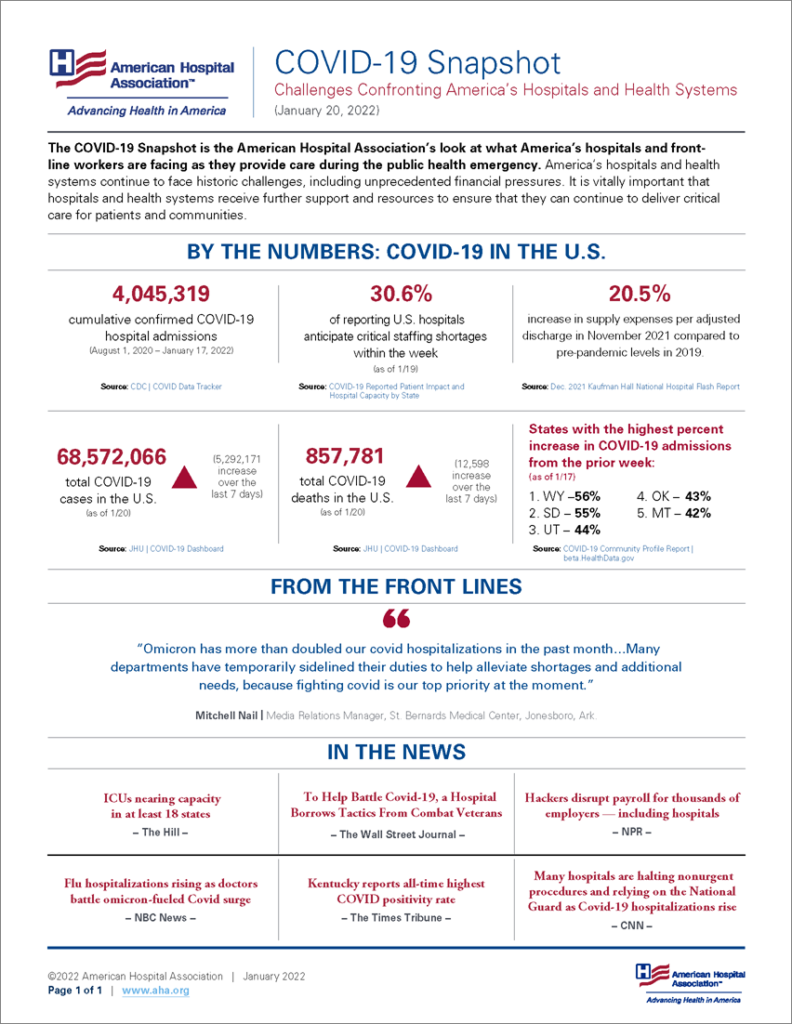The American Hospital Association released its latest COVID Snapshot today.

Bloomberg adds that
The U.S. hospital-staffing shortage exacerbated by the latest Covid-19 wave is showing signs of easing, but many West Coast and rural states are still seeing the worst of it.
Over the past seven days, about 16.7% of U.S. hospitals have reported critical staffing shortages, down from a recent peak of 18.7% on Jan. 9, according to data from the Department of Health and Human Services. Fewer facilities are reporting shortages in populous New York, Florida and Illinois.
The numbers are still concerning to state leaders, but are at least returning to the levels seen in October and November, before the omicron spike.
From the Covid treatment front —
The niftiest COVID news that the FEHBlog ran across today is this GoodRx website that provides “Live Updates on How to Find Paxlovid and Molnupiravir,” respectively the Pfizer and Merck Covid pills. Bookmark it.
From the COVID testing front —
SHRM brings us up to date on the unnecessarily rushed rollout of the federal government mandate that health plans cover over the counter Covid tests. Most plans did not have time to create in-network coverage because health plans do not cover OTC drugstor items except when mandated to do so.
From the COVID vaccine mandate front, FedWeek reports that
The impact of the Coronavirus vaccine mandate in terms of turnover in the federal workforce—either voluntary or not—remains largely anecdotal, although the largest agency, DoD has said there have been “no terminations yet.”
“We are still finalizing the guidance to the civilian force in that regard,” a Pentagon spokesman said late last week in a comment that seems to characterize the state of affairs in general.
From the Rx coverage front —
- Drug Store News reports that
CVS Health is embarking on a collaboration with Uber Health, Uber’s healthcare arm, to provide critical transportation support at no cost to people who need it most when seeking access to medical care, work or educational programs.
The relationship is part of Health Zones, CVS Health’s new initiative that provides concentrated local investments designed to reduce health disparities and advance health equity in high-risk communities across the country. Health Zones is an integrated approach to addressing six key social determinants of health: housing, education, access to food, labor, transportation, and health care access.
The Health Zones initiative is now active in five markets nationwide: Atlanta, Ga.; Columbus, Ohio; Fresno, Calif.; Hartford, Conn.; and Phoenix, Ariz. with plans to expand into more cities later this year. Working with trusted national and local partners, CVS Health is addressing community health care needs, ensuring at-risk communities have access to resources and opportunities that can help them thrive.
- Fierce Healthcare tells us that
Mark Cuban Cost Plus Drug Company (MCCPDC) has launched its online pharmacy as part of an ongoing effort to provide consumers with low drug prices.
The pharmacy claims to offer significant savings, with several prescription drugs reportedly at more than half the cost of the next most affordable option. For instance, leukemia treatment imatinib has a retail price of $9,657 a month, according to MCCPDC, compared to $120 with a common voucher. Its price through the new company, however, is just $47 per month.
The pharmacy’s initial inventory launch consists of 100 generic drugs.
From the No Suprises Act front, Health Payer Intelligence discusses how the new law is likely to spur collaboration between providers and payers to improve the accuracy of provider directories. The FEHBlog has always thought the providers should post the a notice about the networks in which they participate at their offices and on their websites.
